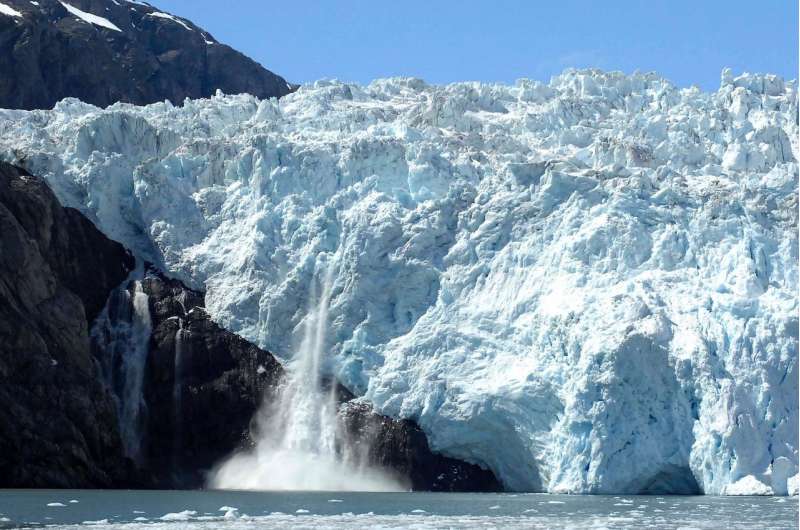Meltwater in the north Atlantic can lead to European summer heat waves, study finds
Scientists from the National Oceanography Centre (NOC) have discovered that increased meltwater in the North Atlantic can trigger a chain of events leading to hotter and drier European summers.
The paper, which is published in the open access journal Weather and Climate Dynamics, suggests that European summer weather is predictable months to years in advance, due to higher levels of freshwater in the North Atlantic.
Discussing the implications, lead author Marilena Oltmanns, Research Scientist at the National Oceanography Centre, said, “While the UK and northern Europe experienced unusually cool and wet weather in Summer 2023, Greenland experienced an unusually warm summer, leading to increased freshwater input into the North Atlantic.”
“Based on the identified chain of events, we expect that the ocean-atmosphere conditions will be favorable for an unusually warm and dry summer over southern Europe this year.”
Marilena continued, “Depending on the pathway of the freshwater in the North Atlantic, we are also expecting a warm and dry summer in northern Europe within the next five years. We will be able to estimate the exact year of the warm and dry summer in northern Europe more closely in the winter before it occurs.”
Melting sea ice and glacial ice are a growing source of freshwater to the North Atlantic, and changes in the amount of sea ice can disrupt normal ocean circulation, influencing global climate. With increases in ice melt, the study suggests that European heat waves and droughts will become more intense in the future. The warming over Europe after strong freshwater releases in the North Atlantic will add to the warming already happening because of climate change, causing weather patterns to shift.
In conclusion, Marilena says, “Our findings demonstrate the importance of ocean observations to ensure climate models capture all physical processes required to make accurate weather predictions. This study is a step forward for improving models, which will enable industries and stakeholders to plan ahead for specific weather conditions, such as adapting agricultural methods to be more resilient, predicting fuel usage, and bracing for flooding events.”
More information:
Marilena Oltmanns et al, European summer weather linked to North Atlantic freshwater anomalies in preceding years, Weather and Climate Dynamics (2024). DOI: 10.5194/wcd-5-109-2024
Citation:
Meltwater in the north Atlantic can lead to European summer heat waves, study finds (2024, February 28)
retrieved 28 February 2024
from https://phys.org/news/2024-02-meltwater-north-atlantic-european-summer.html
This document is subject to copyright. Apart from any fair dealing for the purpose of private study or research, no
part may be reproduced without the written permission. The content is provided for information purposes only.

Scientists from the National Oceanography Centre (NOC) have discovered that increased meltwater in the North Atlantic can trigger a chain of events leading to hotter and drier European summers.
The paper, which is published in the open access journal Weather and Climate Dynamics, suggests that European summer weather is predictable months to years in advance, due to higher levels of freshwater in the North Atlantic.
Discussing the implications, lead author Marilena Oltmanns, Research Scientist at the National Oceanography Centre, said, “While the UK and northern Europe experienced unusually cool and wet weather in Summer 2023, Greenland experienced an unusually warm summer, leading to increased freshwater input into the North Atlantic.”
“Based on the identified chain of events, we expect that the ocean-atmosphere conditions will be favorable for an unusually warm and dry summer over southern Europe this year.”
Marilena continued, “Depending on the pathway of the freshwater in the North Atlantic, we are also expecting a warm and dry summer in northern Europe within the next five years. We will be able to estimate the exact year of the warm and dry summer in northern Europe more closely in the winter before it occurs.”
Melting sea ice and glacial ice are a growing source of freshwater to the North Atlantic, and changes in the amount of sea ice can disrupt normal ocean circulation, influencing global climate. With increases in ice melt, the study suggests that European heat waves and droughts will become more intense in the future. The warming over Europe after strong freshwater releases in the North Atlantic will add to the warming already happening because of climate change, causing weather patterns to shift.
In conclusion, Marilena says, “Our findings demonstrate the importance of ocean observations to ensure climate models capture all physical processes required to make accurate weather predictions. This study is a step forward for improving models, which will enable industries and stakeholders to plan ahead for specific weather conditions, such as adapting agricultural methods to be more resilient, predicting fuel usage, and bracing for flooding events.”
More information:
Marilena Oltmanns et al, European summer weather linked to North Atlantic freshwater anomalies in preceding years, Weather and Climate Dynamics (2024). DOI: 10.5194/wcd-5-109-2024
Citation:
Meltwater in the north Atlantic can lead to European summer heat waves, study finds (2024, February 28)
retrieved 28 February 2024
from https://phys.org/news/2024-02-meltwater-north-atlantic-european-summer.html
This document is subject to copyright. Apart from any fair dealing for the purpose of private study or research, no
part may be reproduced without the written permission. The content is provided for information purposes only.
